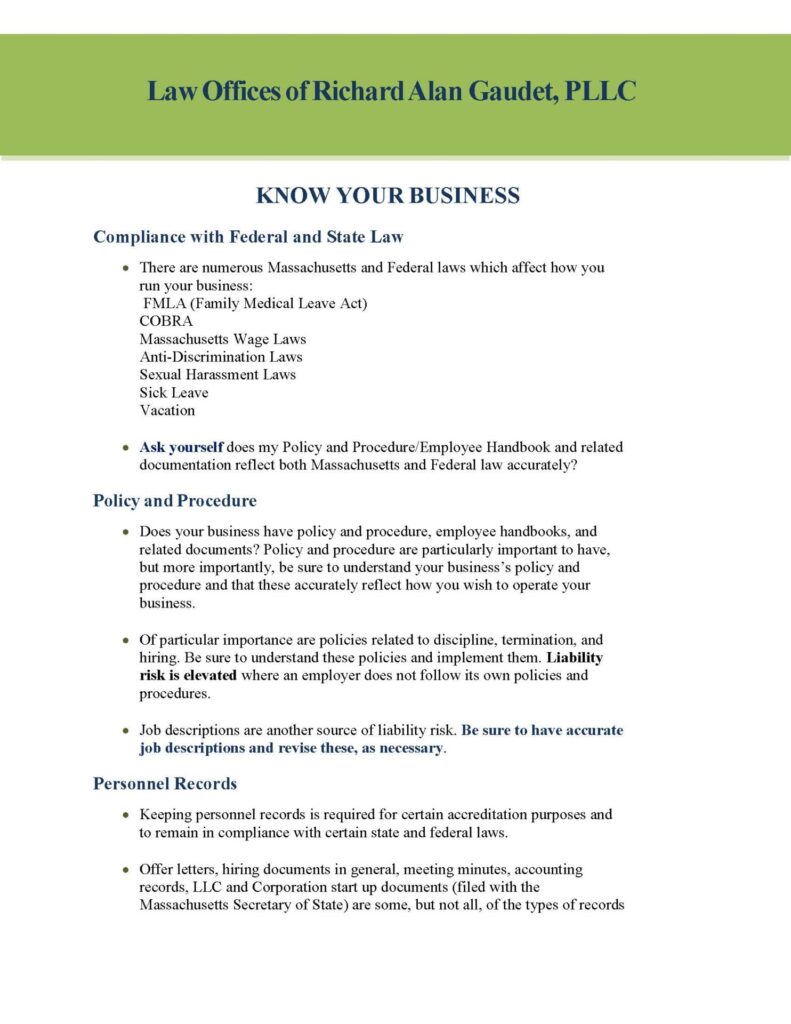
Compliance with Federal and State Law
There are numerous Massachusetts and Federal laws which affect how you run your Massachusetts business:
- FMLA (Family Medical Leave Act)
- COBRA
- Massachusetts Wage Laws
- Anti-Discrimination Laws
- Sexual Harassment Laws
- Sick Leave
- Vacation
Ask yourself does my Policy and Procedure/Employee Handbook and related
documentation reflect both Massachusetts and Federal law accurately?
Policy and Procedure
Does your business have policy and procedure, employee handbooks, and
related documents? Policy and procedure are particularly important to have,
but more importantly, be sure to understand your business’s policy and
procedure and that these accurately reflect how you wish to operate your
business.
Of particular importance are policies related to discipline, termination, and
hiring. Be sure to understand these policies and implement them. Liability
risk is elevated where an employer does not follow its own policies and
procedures.
Job descriptions are another source of liability risk. Be sure to have accurate
job descriptions and revise these, as necessary.
Personnel Records
Keeping personnel records is required for certain accreditation purposes and
to remain in compliance with certain state and federal laws.
Offer letters, hiring documents in general, meeting minutes, accounting
records, LLC and Corporation start up documents (filed with the
Massachusetts Secretary of State) are some, but not all, of the types of records
that a business should (and may be required to keep).
Liability
Liability to a business can occur in many forms: sexual harassment and
discrimination allegations from employees through MCAD or other claims,
property related allegations (slip and fall claims for example), failing to follow
standard accounting practices, and contract related claims from vendors or
1099/Independent Contractor employees for example.
Be sure to have adequate liability protections in place through policy and
procedure that is up to date and have a solid understanding of any terms
and requirements in any contract that the business has entered into.
Liability to business owners can also come in many forms: claims resulting
from breach of contract, violations of shareholder agreements or operating
agreements, commingling or funds, and many more.
Make sure you understand the scope of all contracts and your role in
such contracts.
Vendor and other Business Contracts
Keep in mind that contracting with vendors and various other businesses can
be complex. It is important to make sure that language in a contract, e.g.,
indemnification, assumption of liability, etc., be limited or removed altogether
during the process of negotiating any contract.
Not doing the above may result in terms that are one-sided against your
business.
Sometimes, when drafting a business contract, it is advantageous to use onesided
language because such language is the only way to protect the
intellectual property, or other assets of the business, for example.
When looking to protect your business asset in a specific and precise
manner, be sure to contact our office to ensure the proper language exists
in any business contract.

DISCLAIMER:
The information provided in the pages and posts of this website are for general informational purposes only. The information presented on this site is not legal advice, and no attorney-client relationship is formed by the use of this site.
Contact us today for more information:

